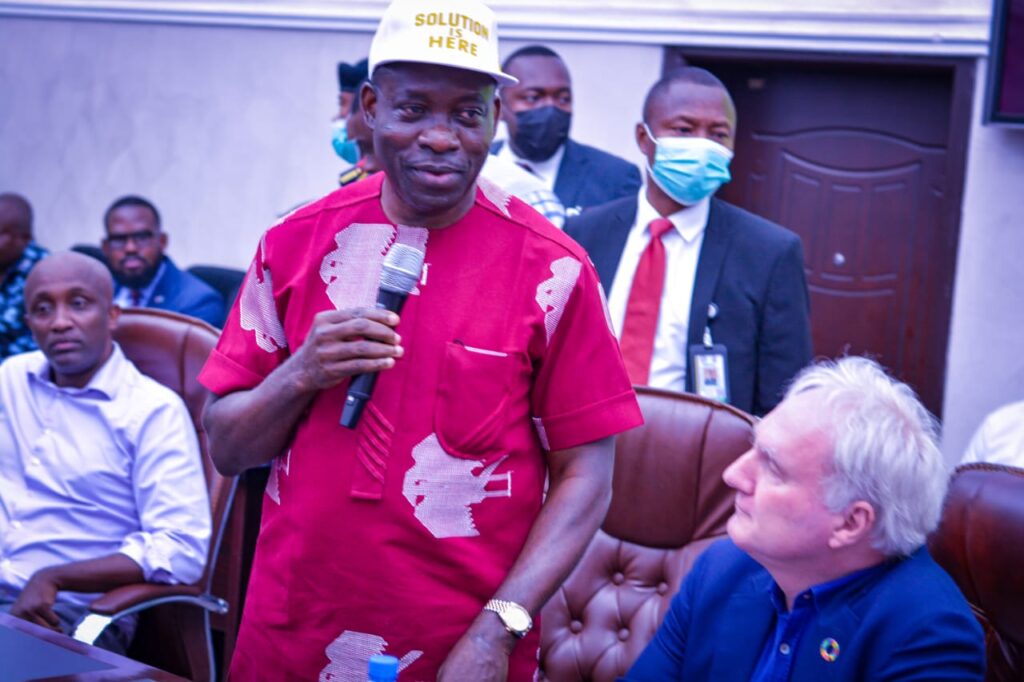
Recently, the media space was awash with the visit of the International Community and Foreign Development Partners, to Anambra State.
Communities coming together to address the biggest global challenges is referred to as International community development, and this approach has gained traction the world-over.
In a strict sense, simply put, a community is any group of people who share resources including roads, water and money. In other words, communities cannot just be viewed as being just one type of group. It could be a continent, country, city or even colleagues working at the same company. With so many different types of communities, one may be wondering how big community development efforts can get. The answer is, International!

Is it best to take an international approach when it comes to community development?; you may ask. Why not let communities solve their issues by themselves? Well, today, we can communicate, trade and travel across International borders more easily than ever before. The world has become so connected by modern technology, that countries and continents are now economically, socially and politically inter-dependent.
The International community development strategy is a good one to follow because it emphasises on viewing the world as one big community, understanding how this global community functions, finding solutions to International concerns by working as a global community.
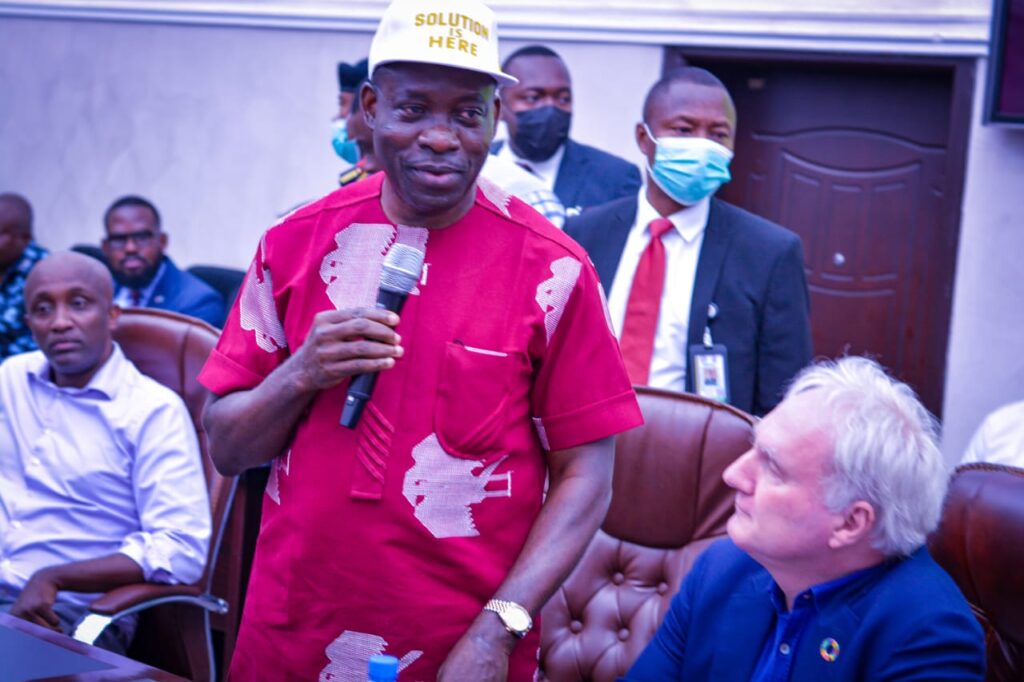
Just ponder on how fluctuations in the United States (US) dollar affects currencies all over the world. It’s because we’re all connected. We are one big global community!
Clearly, this model offers a way for everyone to get involved in and benefit from sustainable community development activities.
The Sustainable Development Goals are a global call to action to terminate poverty, safeguard the earth’s environment and climate, and ensure that people everywhere can enjoy peace and prosperity. These are the goals the United Nations, UN is working on in Nigeria; No poverty, zero hunger, good health, quality education, gender equality, clean water and sanitation, affordable and clean energy, decent work and economic growth, industry, innovation and infrastructure, reduced inequalities, sustainable cities and communities, responsible consumption and production, climate action, life below water, life on land, peace, justice and strong institutions, and partnerships for the goals.

Coincidentally, all these tie to Governor Chukwuma Soludo’s broad vision of building a liveable and prosperous homeland, in line with his manifesto- Soludo’s contract with Ndi Anambra. Little wonder why the UN Humanitarian Resident Coordinator to Nigeria, Mr. Marthias Schmale accepted the Governor’s invitation to pay a farmiliarization visit to Anambra, just in a bid to search out ways to help the state develop.
Mr. Marthias Schmale’s visit was as timely and apt, such that in company of the Governor’s Chief of Staff, Mr. Ernest Ezeajughi, he held a town hall meeting with key stakeholders and interacted with the Governor afterwards, as well as made stops at some erosion sites in the state. Mr Schmale’s visit was a prelude to the visit of the full team of the International Community operating in the Country.

There is no gain-saying that Nigeria’s oil-dependent economy is going through a turbulent period. The sharp drop in global oil prices has had a negative impact on the country’s entire economy and clouded the outlook for the year. Declining oil revenues have put additional stress on President Buhari’s government as he prepares for elections amidst other efforts. Infact, Governor Soludo had said times without number, that no money have been remitted to the federation account from the NNPC since February this year, as a result of which there is dearth of funds in states of the federation.
The government has reduced its spending and placed new foreign currency restrictions on companies. With Nigeria importing over eighty percent of what it consumes, inflation and the cost of living are rising.
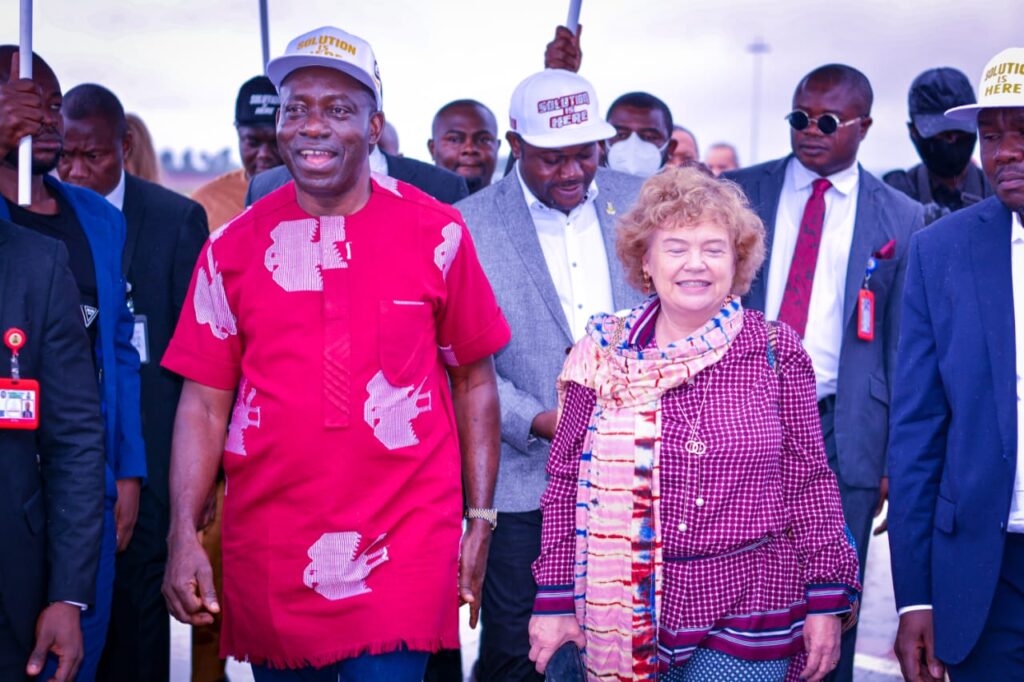
All these challenges and more informed the Governor’s search for alternatives in his quest to make Anambra a highly sought-for island of bliss and prosperity.
And so, some development partners operating in Nigeria arrived Anambra State to undertake on-the-spot assessment, trying to offer support to the state, in keeping with the present administration’s development agenda.
The high-powered delegation include British High Commissioner to Nigeria, Catriona Laing, Chargé d’affaires, German Embassy in Nigeria, Mr Martin Huth and Amb Samuela Isopi of the European Union who is also head of delegation.
Others include Canadian High Commissioner to Nigeria, James Christopher, South African High Commissioner to Nigeria, Thami Mseleku, Resident Representative, International Monetary Fund, Mr Ari Aisen, and US Ambassador to Nigeria, Amb Mary Beth Leonard.
Also in the delegation are the Resident and Humanitarian Cordinator, UN, Mr Matthais Schmale, Country Representative, UNAIDS, Dr Erasmus Morah, Resident Representative, UNDP, Mr Mohamed Yahya, Chief Security Adviser, UNDSS, Mr Robert Marinovic,
Country Representative, WHO, Dr Walter Kazadi Molumbo, Country Director, World Bank, Mr Shubham Chaudhuri, French Ambassador to Nigeria, Amb Emmanuelle Blatmann, Egyptian Ambassador to Nigeria, Amb Ihab Awad, Charge of Affairs, Embassy of Norway, Ms Ingrid Skjokaas, Programme Manager and Senior Conflict Adviser, UNDP, William Tsuma, and Communication Associate, UNDP, Rejoice Emmanuel, and Partnership Analyst, UNDP, Eno-Mfon Akinde.
According to the Governor who hosted them to a meeting at the Government House, Awka, leveraging on strategic partnerships with the federal government, International community and foundations, is at the fulcrum of his administration’s lofty intentions for the state.
While expressing knowledge of the fact that the International Community had contributed immensely to help make Nigeria work, the Governor said that part of Anambra’s future lies in its past, and pointed out that the major strength of the state is in its human resource capital, and identified the state’s weaknesses and threats as the environment, erosion, pollution, insecurity, infrastructure decay, unplanned cities, communities and markets, menace of water hyacinth, flooding, waste management, among others.
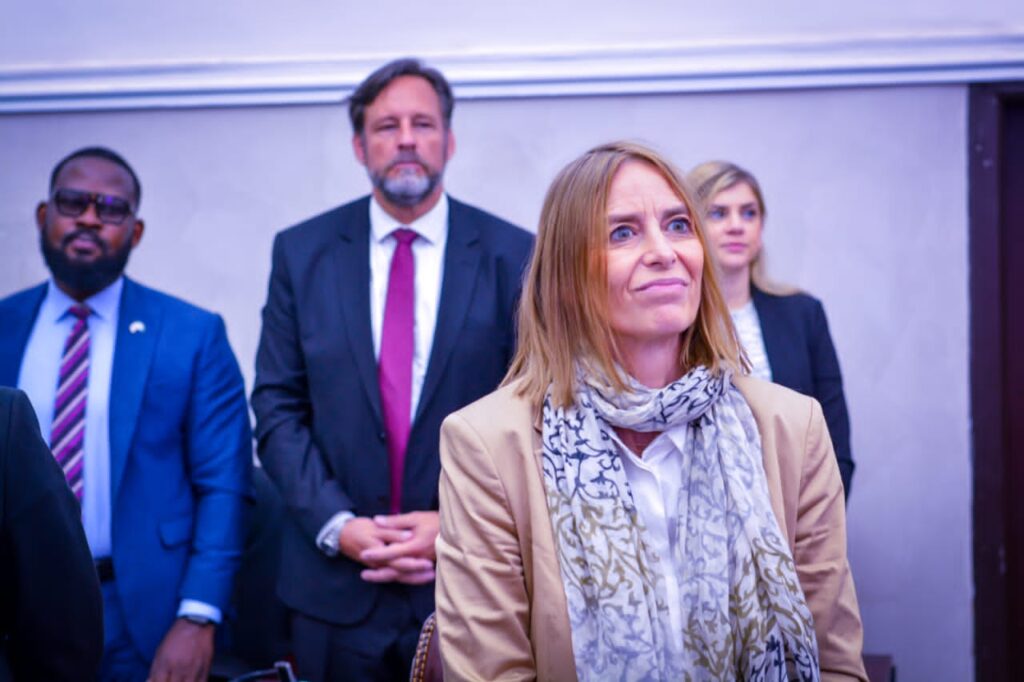
Afterwards, the delegation made their way to the Ancient City of Onitsha with a courtesy visit on the Traditional Ruler of the Community, Igwe Nnaemeka Achebe. The Onitsha Monarch who is also the Chairman of South East Tradional Rulers’ Council explained that Onitsha exists in the location for over 500 years as a center of trade, commerce, manufacturing, missionary and education, explaining that after the civil war, the city have been struggling to get back.
The Monarch who said that the City is over grown as the roads, utility and housing are not enough reiterated Governor Soludo’s quotation that “if Onitsha is not fixed, Anambra will not be fixed and South East cannot be fixed.” He added that development must begin at the community level.
The Governor eventually took the visitors to the Sakamori drainage in Okpoko and other locations in the City which are yearning for intervention.
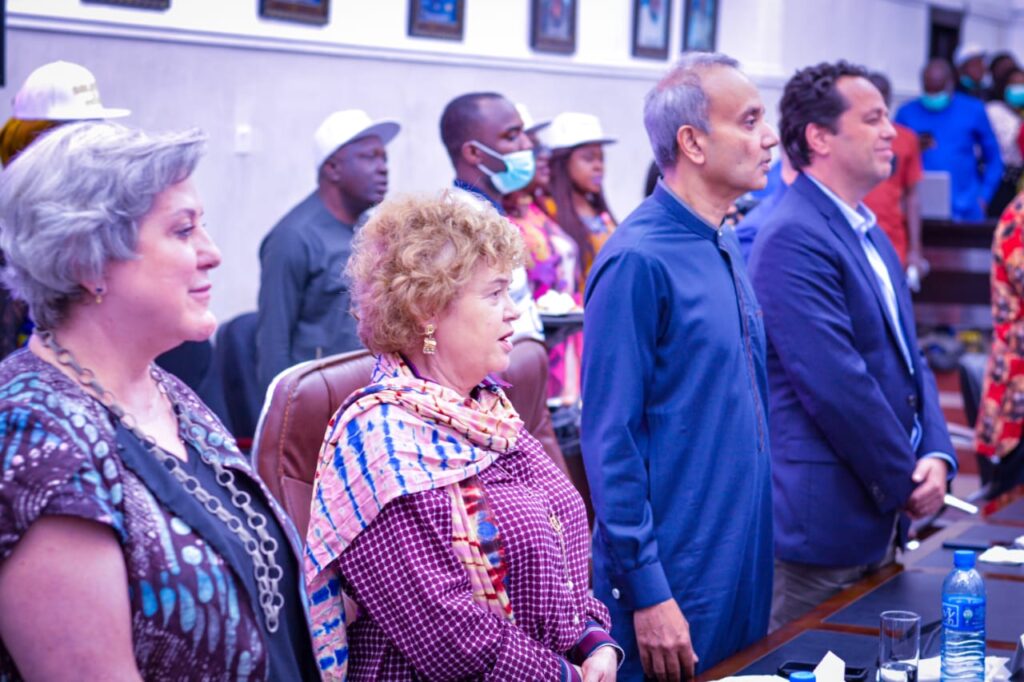
Since sustainable approaches get local people involved from start to finish, they also encourage local ownership of community development efforts. Purely, this is how community development efforts gain long-term momentum.
Once sustainable communities begin supporting each other and receiving International support, local sustainable efforts can add up and contribute to global sustainability; quality healthcare and education, and reductions in poverty worldwide that will last for generations to come.
In conclusion, as the Solution Governor, Professor Chukwuma Soludo knows exactly what he wants to achieve by inviting the International Community to Anambra state because sustainability is key in turning local efforts into International successes. Indeed, centering International community development on sustainable activities is the only way to ensure positive development across Anambra state.
Christian Aburime
Press Secretary
